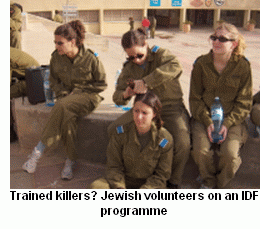 In today’s multicultural Britain, it is accepted that different ethnic and religious groups have close ties with ancestral homelands in other parts of the world. Unless, in the eyes of the New Statesman, you are Jewish.
In today’s multicultural Britain, it is accepted that different ethnic and religious groups have close ties with ancestral homelands in other parts of the world. Unless, in the eyes of the New Statesman, you are Jewish.
In January 2002, the New Statesman printed an infamous front cover entitled “Kosher conspiracy” featuring a Star of David standing on top of a Union Jack, for which the editor was forced to apologise following widespread condemnation. The feature article itself attempted to portray British Jewish supporters of Israel as subscribing to a nefarious agenda incompatible with their British identities. Now it appears that the New Statesman is also questioning the motivations of Jewish youth movements’ legitimate ties to Israel.
In an article on Jewish gap year students taking part in IDF volunteer programmes in Israel, Matthew Holehouse makes it clear in the first paragraph where he wishes to lead his readers, referring to Islamic Jihad summer schools in Gaza teaching Palestinian adolescents to become suicide bombers. The scene is therefore set to ensure that the reader will draw a moral equivalence between the activities of Jewish and Palestinian youths.
Holehouse leaves out vital context that demonstrates his misunderstanding of the role of Jewish gap year programmes, some of which include short stints of simulated army training designed to help participants understand the IDF’s role in society. Most Israeli school leavers are drafted for 2-3 years into the IDF for compulsory national service as a result of the threats to Israel that exist from neighbouring states and from continuing Palestinian terror. Israeli national service is an unfortunate necessity that is part of growing up in the Jewish state and a right of passage that Israeli parents would gladly dispense with if their country was not under threat. 
The primary role of IDF volunteer programmes for British Jewish youth is simply to enable British Jewish youth to understand and connect with their Israeli contemporaries thus strengthening the ties between Israel and the Jewish Disapora. It is certainly not to train British Jews to become active soldiers or participants in the military conflict in the Middle East. There is no moral equivalence between Jewish gap year students taking part in IDF programmes and Muslim youths sent to military training camps in Pakistan and the Middle East for the express purpose of learning how to become terrorists.
Holehouse’s subtle prejudice also appears in his statement that large numbers of participants from Jewish youth movements come from public schools in Manchester and North London. With no evidence to back this up, is Holehouse stereotyping Jews as wealthy? Is this statement even relevant to the article?
Holehouse then sets about tarnishing the image of British Jewish youth movements. He claims that “Marva [the IDF volunteer programme] demonstrates how some Zionists have inadvertently come to mimic their opponents in defining Israel solely by its militarism.” A closer look at the gap year schemes of Jewish youth movements that take part in Marva would reveal that this represents but a small part of the year programme, which also includes time spent doing other volunteer activities, studying and travelling around Israel.
Holehouse misrepresents the Federation of Zionist Youth as “one of the largest and most hard-line organisers of gap years”, despite the fact that FZY’s guiding ideology is politically and religiously pluralistic. Is Holehouse attempting to equate “Zionist” and “hard-line” in the same way that Israel’s detractors use the term “Zionist” as a term of abuse?
The New Statesman’s feature ends with the shocking question: “If these were British Muslim 19 year-olds firing machine guns and running assault courses in Pakistan or Yemen, would we not have them all arrested at the airport?” The sad reality is that terrorist attacks have already taken place on British soil with the involvement of British Muslims trained abroad. British Jewish youths are not being trained to become armed versions of the Scouts, nor are they motivated to carry out acts of terror in Britain or elsewhere. The New Statesman’s ridiculous moral equivalence is contemptuous and irresponsible.
Please send your considered comments to the New Statesman – [email protected]
RECOMMENDED READING 
- Writing in the Washington Post, Denis MacShane MP tackles the New Anti-Semitism:
Europe is reawakening its old demons, but today there is a difference. The old anti-Semitism and anti-Zionism have morphed into something more dangerous. Anti-Semitism today is officially sanctioned state ideology and is being turned into a mobilizing and organizing force to recruit thousands in a new crusade — the word is chosen deliberately — to eradicate Jewishness from the region whence it came and to weaken and undermine all the humanist values of rule of law, tolerance and respect for core rights such as free expression that Jews have fought for over time.
-
Howard Jacobson asks in The Independent, why there seems to be a pecking order among the dispossessed, and Jews come last:
 Why the rhetoric of sympathy for Palestinian homelessness – “When we lost our country, we lost respect,” Pilger has a Palestinian refugee lament – but no answering sympathy for the lost respect and homelessness that found expression in Zionism? I am one of those who believe that Jewish experience of exile obliges Israel actively to comprehend the sorrows of Palestinian exile. But I also believe this must cut both ways. If it is terrible to lose your home today, then it was terrible to lose your home yesterday, whoever you are. For Pilger, there are no such competing claims on his understanding. There are the forgotten, disrespected Palestinians on the one hand, and the “fanatics of Zion” on the other.
Why the rhetoric of sympathy for Palestinian homelessness – “When we lost our country, we lost respect,” Pilger has a Palestinian refugee lament – but no answering sympathy for the lost respect and homelessness that found expression in Zionism? I am one of those who believe that Jewish experience of exile obliges Israel actively to comprehend the sorrows of Palestinian exile. But I also believe this must cut both ways. If it is terrible to lose your home today, then it was terrible to lose your home yesterday, whoever you are. For Pilger, there are no such competing claims on his understanding. There are the forgotten, disrespected Palestinians on the one hand, and the “fanatics of Zion” on the other.

